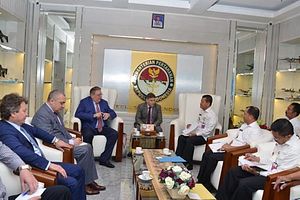Earlier this month, Russian media quoted Indonesian Defense Minister Ryamizard Ryacudu as saying that the operationalization of a long-mulled deal involving Russian fighter jets would commence by the end of the year. The comments once again put the spotlight on the status of the agreement between the two countries as part of their ongoing defense collaboration amid lingering challenges and uncertainties.
As I have noted before in these pages, Russia and Indonesia have long had a defense relationship as part of their wider ties, and Moscow still remains Jakarta’s largest military supplier in spite of ongoing changes and diversification. Both sides have also been mulling several deals as well as broader advances in defense cooperation recently, looking at not just purchases but also more ambitious areas like technology transfers and joint development and production despite challenges therein.
One of the deals that has been in the works for years is Russia’s sale of Su-35 fighter jets to Indonesia. Though Indonesia’s Ryacudu officially announced that Indonesia had decided to buy the Russian aircraft back in 2015, there was no confirmation of a contract being reached until early 2018, for a total of 11 full combat Su-35 aircraft. Repeated delays on official announcements have continued since then amid broader issues related to both the deal itself as well as wider policy considerations, including U.S. scrutiny regarding Southeast Asian defense purchases from Moscow.
Last week, this was in the headlines again when Russian news agency TASS quoted Ryacudu as saying that Indonesia expects the deal to be operationalized by the end of 2019.
Per TASS, Ryacudu said that he thinks “that the issue will be solved this year.” He added that while there were certain challenges in finalizing the contract due to approvals required from various departments within Indonesia as well as different forms of payment, “fundamentally the issue has been solved.”
Whether or not this will be the case remains to be seen. To be sure, Ryacudu has certainly been consistent in conveying the fact that Indonesia remains committed to the deal. But given the repeated delays we have seen, the lingering challenges that have been cited, as well as the variables that remain as the dust settles following Indonesia’s recent presidential elections with implications for its foreign and defense policy, one should be cautious about claims about specific deadlines until there are more concrete signs that they are being realized.
































